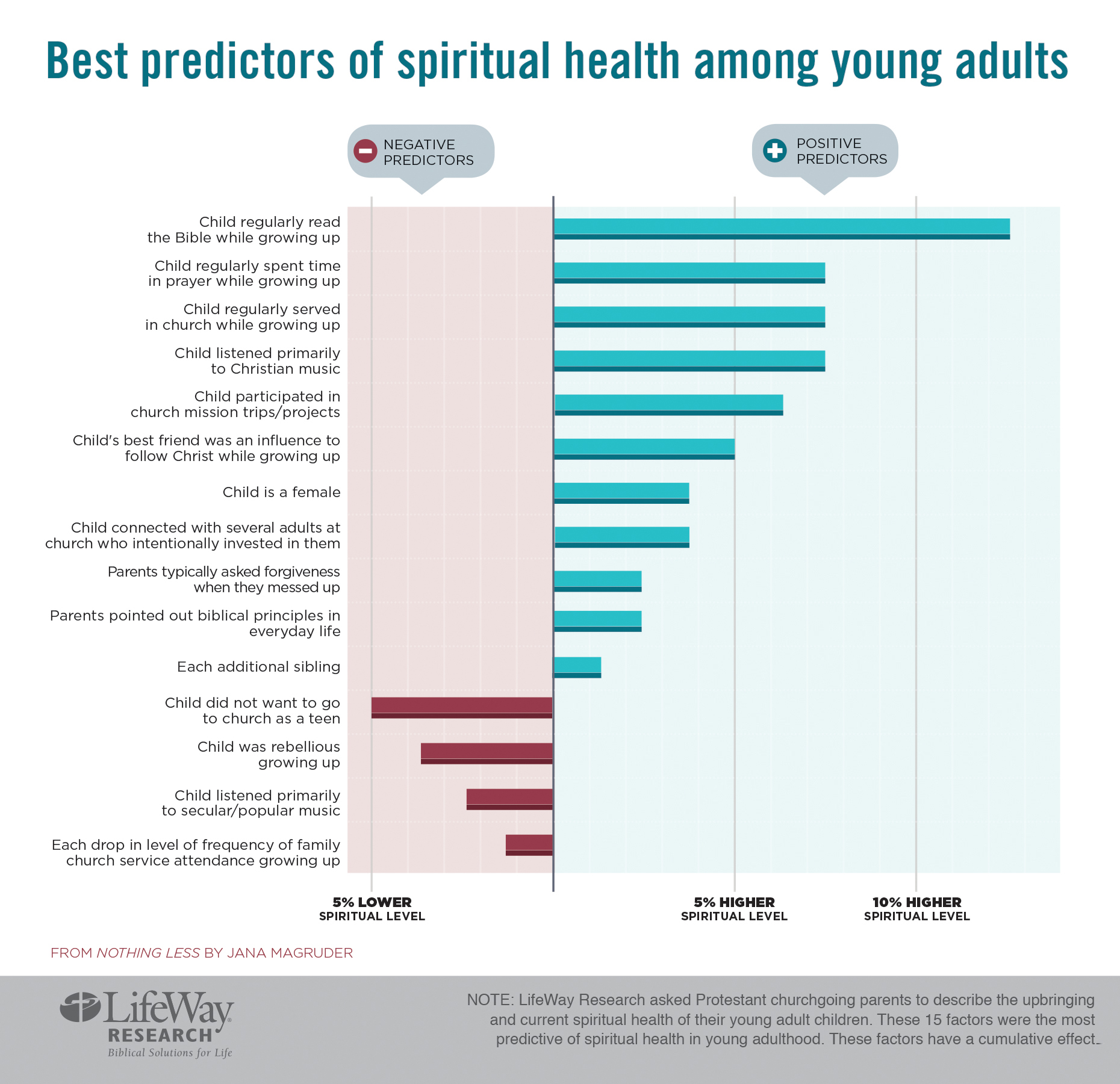
By Jenny Whitaker
As a kids ministry leader, I spend time studying and reading research to find out what’s working and what isn’t when it comes to helping kids grow into spiritually strong adults. The research and, more importantly, the Bible, are clear on one thing: The primary job is not mine; it is the parents’ duty.
Research says young adults are leaving the church at a high rate. They’re growing up and walking away from the faith. In short: they never own their faith. They simply do as they’re told, attend the programs, take part in the discipleship events, and eventually, leave it all behind.
But how do I best partner with and equip parents so that we can see our kids grow into spiritually strong adults—people who are active participants in a local congregation? The key to seeing kids grow into faithful churchgoers and spiritually strong adults is daily Bible reading.
The key to seeing kids grow into faithful churchgoers and spiritually strong adults is daily Bible reading. Click To TweetIn a study of 2,500 Protestant churchgoers, Lifeway’s Discipleship Pathway Assessment study found only 32% read the Bible daily, 40% read the Bible once a week or less, and 12% said they rarely or never opened the Scriptures. Take it a step further, and you will find in this same research that the younger the respondent, the less likely they were to read the Bible every day.
Even more directly, in a previous study Lifeway Research asked parents about the spiritual practices of their children as kids and then as adults to discover what activities and attitudes best predict a child raised in a Christian home will become a spiritually healthy adult. The best predictor? The child regularly read the Bible growing up.

So, what does that mean for kids ministry leaders—and the church in general? What lesson(s) do we take away from research like this?
Prioritize Bible reading for kids
First, we need to have a focus on daily Bible reading. If there’s a direct relationship between regular church attendance and regular Bible reading, and most people who identify as Protestant churchgoers aren’t reading the Bible regularly, what does that look like for the future of the church? I’ll tell you; it doesn’t look good.
In order to raise up a generation of spiritually strong, faithful churchgoers who will begin to set the trend in the opposite direction, we must get out of the way and give them the One who can do what we cannot. And they’ll find Him in their Bible.
So much of what we do to engage kids and parents is good, but perhaps not best when it comes to finding ways to equip families to engage in biblical parenting.
So much of what we do to engage kids and parents is good, but perhaps not best when it comes to finding ways to equip families to engage in biblical parenting. — @JenWhitaker00 Click To TweetYes, there is a place for our outreach events. Fall festivals and Easter egg hunts alike share love and give us an opportunity to connect with our community, but oftentimes with these types of events, we forget to consider a follow-up strategy, which is where outreach meets discipleship.
Vacation Bible School is one exception, as most VBS programs have a built-in follow-up strategy. We reach kids and we develop those who are already disciples so that we can continue helping them to grow. Some of us even have strategies in place to help reach, equip, and engage parents during and after VBS so parents can be part of the discipleship journey when the event is over.
With other smaller ministry events we can forget to include follow-up in our strategy altogether and even less so when we are catering to the families who are already engaged in our church.
We may send home weekly take-home sheets from Sunday School, emails or texts to equip parents to continue the conversations at home, and Scripture verses they can read with their family, and while all of these are good things, I’d argue that perhaps there’s an integral step we’re missing.
Prioritize Bible reading for parents
As I considered this research and what it might mean in my own ministry, one thing became clear: If I need to equip my parents to engage their kids in regular Bible reading, I also need to make sure I equip my parents to be doing the same for themselves.
If I need to equip my parents to engage their kids in regular Bible reading, I also need to make sure I equip my parents to be doing the same for themselves. — @jenwhitaker00 Click To TweetAnd that’s where the real challenge comes in. This isn’t just a job for the kids or family ministries of your church; this is a core discipleship issue in which the entire church needs to be involved.
What things are your church doing to encourage churchgoers to read the Bible daily? Is there a sense of accountability? Is there even a sense of importance? Does it get taught? Or is it just assumed that churchgoers are regular Bible readers? The research is clear that such an assumption is far from true.
As a parent, I can tell my kids to do things, but if it’s new to them or seems too challenging, they won’t be successful—at least not in the long term. And long term is what we’re in the business of as a church. Discipleship is a life-long journey—one that research shows plateaus or stagnates (if it doesn’t end altogether) without regular Bible engagement.
Discipleship is a life-long journey—one that research shows plateaus or stagnates (if it doesn’t end altogether) without regular Bible engagement. — @jenwhitaker00 Click To TweetIn kids ministry this may mean challenging kids to open their Bible and find the same verse every day for a week. You might be wondering why the same verse? Depending on the age or Bible literacy of the child—or the adult for that matter—this is going to help with a myriad of Bible skills.
First, it builds a habit of opening God’s Word daily. It’s also exposing them to the same verse every day, which will help with Scripture memorization. And depending on the age of the child, you may see that they will reflect on that verse and start to analyze it, building those Bible study skills they’ll need as they grow in their faith.
From there, the sky is the limit. And the same principles can be applied to adults—parents, in particular.
Partner with Sunday School teachers or small group leaders. Share the research with your pastoral staff and work together to identify and employ strategies to move the needle as it applies to your families.
Developing daily Bible readers
Maybe you have a majority of people who never open the Bible, or perhaps a majority of your families open it only a few times a week. Identify your starting point and find ways to build from there.
I’m in the process of training for a triathlon. My coach didn’t start me out with long runs, swims, or rides; she’s teaching me how to warm up properly, how to build my base and design a road map to get from where I am to where I want to be. The same strategy should be employed for any habit or discipline, and for any age.
In the same Lifeway Research study of 2,500 churchgoers, respondents were also asked if they missed the time with God when they went several days without reading the Bible. More than half (58%) of respondents agreed that they desperately missed that time with God.
This brings me back to my earlier point. The desire to spend time with God is not something we can give to parents or kids; only the Holy Spirit can do that. So, it stands to reason that a lot of the challenges we face as church leaders—and even as parents trying to disciple our own kids—may be resolved by simply creating a culture of daily Bible readers.
Now is the time to evaluate our ministry strategies to identify what, if anything, we’re doing to help parents be engaged in biblical parenting. Without engaging parents in this strategy, we’ll miss one of the most valuable investments we can make in the next generation.

Jenny Whitaker
Jenny is the children and family ministry director of Bradfordville First Baptist Church in Tallahassee, Fla., where she lives with her husband and three children. Jenny is a writer for Lifeway Kids curriculum and enjoys training children’s ministry leaders across the state of Florida.








